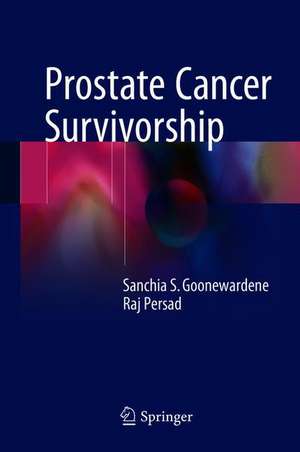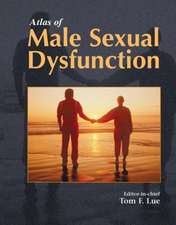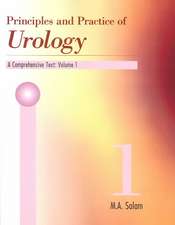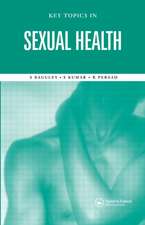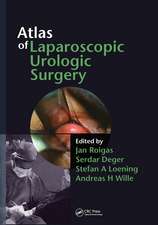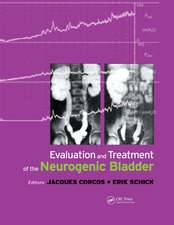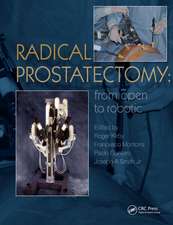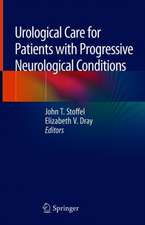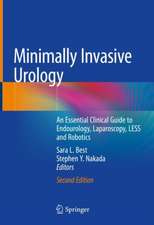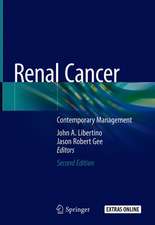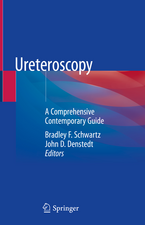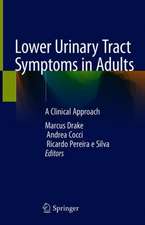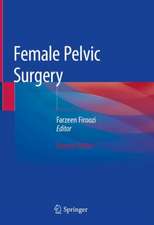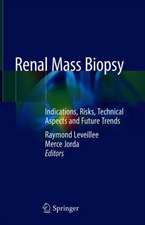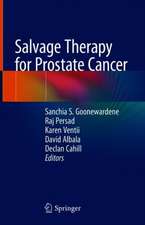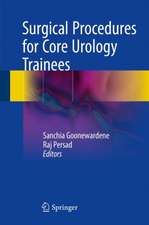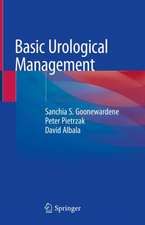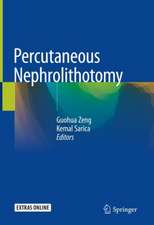Prostate Cancer Survivorship
Autor Sanchia S. Goonewardene, Raj Persaden Limba Engleză Hardback – 25 mai 2018
This book aims to give oncologists, urologists, and specialist nurses help in how to manage patients in the prostate cancer survivorship phase. This guidance is based on real life experiences handling prostate cancer survivorship, and is developed further through utilising the views of both health care professionals and patients.
| Toate formatele și edițiile | Preț | Express |
|---|---|---|
| Paperback (1) | 661.42 lei 3-5 săpt. | |
| Springer International Publishing – 21 dec 2018 | 661.42 lei 3-5 săpt. | |
| Hardback (1) | 736.20 lei 3-5 săpt. | |
| Springer International Publishing – 25 mai 2018 | 736.20 lei 3-5 săpt. |
Preț: 736.20 lei
Preț vechi: 774.94 lei
-5% Nou
Puncte Express: 1104
Preț estimativ în valută:
140.88€ • 150.64$ • 117.46£
140.88€ • 150.64$ • 117.46£
Carte disponibilă
Livrare economică 27 martie-10 aprilie
Preluare comenzi: 021 569.72.76
Specificații
ISBN-13: 9783319653570
ISBN-10: 3319653571
Pagini: 350
Ilustrații: XXIII, 369 p. 26 illus. in color.
Dimensiuni: 155 x 235 x 21 mm
Greutate: 0.93 kg
Ediția:1st ed. 2018
Editura: Springer International Publishing
Colecția Springer
Locul publicării:Cham, Switzerland
ISBN-10: 3319653571
Pagini: 350
Ilustrații: XXIII, 369 p. 26 illus. in color.
Dimensiuni: 155 x 235 x 21 mm
Greutate: 0.93 kg
Ediția:1st ed. 2018
Editura: Springer International Publishing
Colecția Springer
Locul publicării:Cham, Switzerland
Cuprins
1. Acknowledgements.- 2. Introduction.- 3. Prostate cancer.- 4. Cancer survivorship.- 5. Prostate cancer and radical treatment.- 6. Definition of Psychosexual care and importance post-surgery for prostate cancer. 7.Barriers to psychosexual care.- 8. Impact of Psychosexual care on patient health related quality of life (QOL).- 9. Importance of addressing psychosexual concerns.- 10. Pharmacological and non-pharmacological treatment for improved sexual function.- 11. Post treatment monitoring for recurrence - the ‘usual pathway.- 12. Current follow-up care pathway vs. a new ‘psychosexual’ pathway.- 13. Current prostate cancer survivorship care pathways.- 14. Impact of Acute and chronic co-morbidities on psychosexual concerns.- 15. Barriers to psychosexual care- the ‘psycho-social’ part.- 16. Assessment of psychosexual concerns, health related quality of life and acute and chronic co-morbidities in patients post-surgery for prostate cancer.- 17. Psychosexual interventions.- 18. Needs, challenges and UK survivorship initiative and solutions.- 19. Needs and challenges in survivorship care.- 20. Systematic review – Requirement for care.- 21 Systematic review - search strategy.- 22. Systematic Review - eligibility and types of studies to be included.- 23. Systematic review– identifying studies, data extraction and quality assessment of studies.- 24. Systematic review - characteristics of studies.- 25. Statement of main findings.- 26. Quality assessment of studies – systematic review.- 27. Did the studies address clearly focused issues?.- 28. Recruitment of cohorts.- 29. Tools used in assessment.- 30. Confounding factors and alteration of study design for studies in systematic review.- 31. Unmet needs and psychosexual concerns.- 32. Medical components of psychosexual pathways- medications and erectile devices.- 33. Medical components of psychosexual pathways- intracavernosal injection therapy and penile prostheses.- 34. Requirement for psychosexual pathways.- 35. Communication and support.- 36. Psychosexual concerns and time since procedure.- 37. Patient age, co-morbidities and psychosexual concerns.- 38. Psychosexual impairment, degree of surgery and erectile aids.- 39. Psychosexual care and quality of life.- 40. Psychosexual care and Integration back into society.- 41. Strengths and limitations- systematic review.- 42. Findings in relation to other psychosexual studies and trends in literature – systematic review.- 43. Current systematic reviews relating to systematic review.- 44. Psychosexual care and unmet need, Requirements for a psychosexual pathway and components of pathways.- 45. Psychosexual care and role of couple.- 46. Interventions on psychosexual concerns.- 47. Statement of main findings and specific areas of unmet needs arising from systematic review.- 48. Systematic review – conclusion.- 49. Follow-up pathway structures.- 50. Research methods in survivorship.- 51. Patient focus group results.- 52. Healthcare professional focus group results.- 53. Generation of themes.- 54. Survivorship care an unmet need.- 55. A new model of care.- 56. Areas to address in psychosexual care and survivorship.- 57. The future for survivorship care.- 58. Impact of psychosexual care on uro oncology.- 59. Impact of acute and chronic co-morbidities on survivorship.- 60. Assessment of psychosexual concerns, health related quality of life and acute and chronic co-morbidities in patients post-surgery for prostate cancer.- 61. Psychosexual interventions in survivorship care.- 62. Psychosexual care – the literature.- 63. Current NHS care.- 64. Unmet needs.- 65. The Worcestershire Prostate cancer database.- 66. The Prostate Cancer Survivorship care assessment tool.- 67. Role of patient conferences in current care.- 68. Prostate cancer survivorship- a systematic review.- 69. Medical requirements in survivorship.- 70. Sexual impairment in survivorship.- 71. Work related symptoms and support.- 72. Diet and exercise.- 73. Survivorship Inerventions.- 74.Development of survivorship interventions.- 75. Survivorship studies, methods of follow-up.- 76. Survivorship needs.- 77. Lack of care.- 78. Exercise and nutrition.- 79. Communication and families.- 80. Areas of care to be developed.- 81. Mixed methods research.- 82. Symptom control in survivorship care.- 83. Ongoing health needs.- 84. Medical requirements in survivorship.- 85. Work related symptoms.- 86. Medical care and communication.- 87. Psychosexual impairment and adjuvant therapy.- 88. Psychosexual care- what the literature says.- 89. Systematic review- diet and exercise therapy.- 90. UK diet and exercise studies.- 91. Medical requirements in survivorship.- 92. Diet and exercise- is it important?.- 93. Diet and exercise interventions.- 94. Patient diet and exercise needs.
Notă biografică
Sanchia Goonewardene MBChB (Hons.Clin.Sc), BMedSc(Hons), PGCGC, Dip.SSc, MRCS. qualified from Birmingham Medical School with Honours in Clinical Science. After that she completed her Foundation training at the Royal Centre for Defence Medicine. Her Core General Surgery training was completed in Coventry and Warwickshire. She has worked as Urology registrar at Guys and St. Thomas Hospitals, London, where she is also Honorary Fellow. She has over 30 publications to her name, with over 60 presentations, and has significantly contributed to the Urological Academic World- she has since added a section to EAU on Prostate Cancer Survivorship and Supportive Care, is an associate member of an EAU guidelines panel and has currently been given her first editorial board position.
Professor Raj Persad has been a practising Uro-Oncology surgeon with an international reputation for innovation and research, since 1996. He specialises in Bladder, Prostate and Kidney Cancer. He has served on key National and International committees for guideline development, service reform and research such as the National Cancer Intelligence Network, National Cancer Research Institute, NIHR-RfPB, NICE, IBCG, BAUS Section of Oncology and Cancer Research UK. He is one of the country's leading pelvic cancer surgeons bringing with him advanced surgical techniques with him from his training abroad in the US and Europe. He leads an active research programme and is the recipient of £5m in research grants.
Textul de pe ultima copertă
This book provides information on a range of issues related to prostate cancer survivorship, including; psychosexual care, health related quality of life, treatment, follow-up care, new psychosexual pathways, and acute and chronic co-morbidities. The book also covers the needs and challenges in survivorship care, the requirements of care, the future of survivorship care, and role of patient conferences.
This book aims to give oncologists, urologists, and specialist nurses help in how to manage patients in the prostate cancer survivorship phase. This guidance is based on real life experiences handling prostate cancer survivorship, and is developed further through utilising the views of both health care professionals and patients.
Caracteristici
Key points summarised at the end of each chapter Covers the latest literature and management pathways Utilises author's experience and research on cancer survivorship
